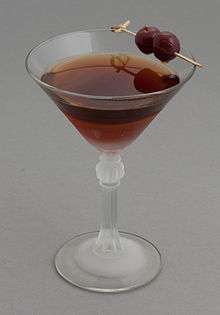Rob Roy (cocktail)
 | |
| Type | Cocktail |
|---|---|
| Primary alcohol by volume | |
| Served | Choice of "straight up" or "On the rocks" |
| Standard garnish |
2 Maraschino cherries on a skewer or lemon twist |
| Standard drinkware | |
| Commonly used ingredients |
|
| Preparation | Stirred over ice, strained into a chilled glass, garnished, and served straight up, or mixed in rocks glass, filled with ice. |
The Rob Roy is a cocktail created in 1894 by a bartender at the Waldorf Astoria in Manhattan, New York City. The drink was named in honor of the premiere of Rob Roy, an operetta by composer Reginald De Koven and lyricist Harry B. Smith loosely based upon Scottish folk hero Rob Roy MacGregor.[1][2]
A Rob Roy is similar to a Manhattan but is made exclusively with Scotch whisky, while the Manhattan is traditionally made with rye and today commonly made with bourbon or Canadian whisky.[3][4][5]
Like the Manhattan, the Rob Roy can be made "sweet", "dry", or "perfect". The standard Rob Roy is the sweet version, made with sweet vermouth, so there is no need to specify a "sweet" Rob Roy when ordering. A "dry" Rob Roy is made by replacing the sweet vermouth with dry vermouth. A "perfect" Rob Roy is made with equal parts sweet and dry vermouth.[4][5][6]
The Rob Roy is usually served in a cocktail glass and garnished with 2 maraschino cherries on a skewer (for the standard version) or a lemon twist (for the perfect and dry versions).[4][5][6]
See also
- List of cocktails
-
 Liquor portal
Liquor portal
References
- ↑ Andrews, Sudhir (2008). Textbook of Food & Beverage Management. Tata McGraw-Hill. p. 248. ISBN 978-0-07-065573-7.
- ↑ "'Rob Roy' a Good Operetta" The New York Times (October 30, 1894)
- ↑ "Rob Roy Recipe" on the Real Restaurant Recipes website (2006). Accessed: May 19, 2011.
- 1 2 3 Graham, Colleen. "Rob Roy" on About.com Accessed: May 19, 2011.
- 1 2 3 Wondrich, David. "Rob Roy" Esquire (November 5, 2007). Accessed: May 19, 2011.
- 1 2 Jacobo. "How To Prepare a Rob Roy Cocktail" Videojug Accessed: May 19, 2011.